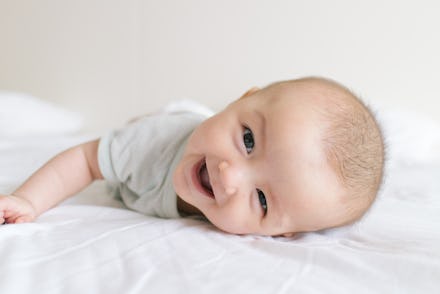The Difference in Baby Names Between Liberal and Conservative Parents

What's in a name? A whole lot, it turns out, including your parents' political ideology.
The news: Using birth records from close to 550,000 babies born in California in 2004 (a collection representing more than half a million different names), University of Chicago researchers found that liberal parents pick more feminine, softer-sounding names while conservatives choose masculine, tougher-sounding titles.
Left-leaning parents were more likely to name their kids Ely, Liam or Sophia — softer-sounding names heavy on A's and L's, while right-wing parents opt for monikers like Bristol or Kurt, with more K's, B's and T's. Liberal parents are also more likely to pick unique names like Esme or Ashton.
Blame your parents: Whether or not they do it intentionally, parents use names as a way to indicate their children's social status, lead researcher and political scientist Eric Oliver told LiveScience. So if you got stuck with a name that sounds more like Apple than Amanda, chances are your liberal parents wanted to help set you apart. As for the Barbaras and Timothys out there, it's more likely that your conservative folks wanted to connect you with their long line of wealth and success.
Importantly, the naming differences only held steady for well-educated parents. Less-educated parents (regardless of political ideology) were more likely to invent names or choose uncommon spellings for popular names (Lezlee instead of Leslie, for example).
And while many people mistakenly associate uncommon names with racial minorities, unusual names are more directly associated with income, not race. "'Hunter,'" for example, "is just as unusual as 'Malik,' but it's understood as 'normal' because of its association with white men," writes the Daily Beast's Jamelle Bouie. Moreover, the link between unusual names and political ideology is strongest among wealthy, well-educated white parents.
A relatively new phenomenon: Baby names weren't always used to indicate parents' social status. That trend began somewhere in the past two or three decades, when people shifted away from the bland baby names of the 1950s and '60s, according to Laura Wattenberg, author of the popular book The Baby Name Wizard. Half of all girls born in the 1950s had one of just 50 names; half of all boys had one of 25 names. Today, that number has skyrocketed to 320 names for girls and 134 for boys. Because there are now so many options out there, a parent's choice can carry more weight than it had in the past.
Regardless of whether you got stuck with Kasper or Katie, chances are your parents wanted to share a bit of their legacy with you. So be proud of your name. Besides, it's the only one you've got, right?